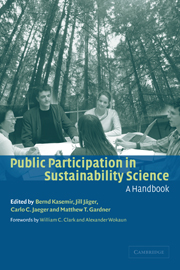Book contents
- Frontmatter
- Contents
- Notes on contributors
- Foreword: science, participation, and sustainability
- Foreword: sustainability, energy use, and public participation
- Preface
- Acknowledgments
- Part I Concepts and insights
- Part II Experiences with IA Focus Groups
- Part III Further forms of participation
- Part IV Future perspectives
- Introduction
- 11 From projects to program in integrated assessment research
- 12 Citizen participation and developing country agendas
- 13 Linking the citizen to governance for sustainable climate futures
- References
- Index
13 - Linking the citizen to governance for sustainable climate futures
Published online by Cambridge University Press: 22 September 2009
- Frontmatter
- Contents
- Notes on contributors
- Foreword: science, participation, and sustainability
- Foreword: sustainability, energy use, and public participation
- Preface
- Acknowledgments
- Part I Concepts and insights
- Part II Experiences with IA Focus Groups
- Part III Further forms of participation
- Part IV Future perspectives
- Introduction
- 11 From projects to program in integrated assessment research
- 12 Citizen participation and developing country agendas
- 13 Linking the citizen to governance for sustainable climate futures
- References
- Index
Summary
The coupling of humans and nature
It is now apparent that climate is no longer a natural phenomenon. Indeed, there is no such thing as a single climate future. We have begun to recognize that the climate that will embrace our grandchildren will largely be determined by how we behave, how we run our democracies, how we value the morality of fairness, and how we relate our everyday actions to how we feel about the impact of future climates on our grandchildren's neighbors. What is particularly significant about this state of affairs is that the decisions we take, individually and collectively in the next two decades, will have a huge affect on the nature of climate a century hence. The profound truth is that we cannot escape our responsibilities for shaping future climates, by leaving it to future generations to determine.
The purpose of this chapter is to examine the implications of this perspective for further research and active policy design aimed at linking citizens to new vistas of governance. That governance will involve many centers of power at every conceivable scale. It will be determined by partnerships with business and civil society through innovative formal and informal arrangements. It will require a participatory form of democracy whose early manifestations are beginning to appear. The implications for both theory and methodology, as well as for climate change research are considerable. At the very least, research will become an active ingredient in this new pattern of governance.
- Type
- Chapter
- Information
- Public Participation in Sustainability ScienceA Handbook, pp. 239 - 248Publisher: Cambridge University PressPrint publication year: 2003
- 6
- Cited by

